商务英语口译教程.doc
- 格式:doc
- 大小:78.02 KB
- 文档页数:3
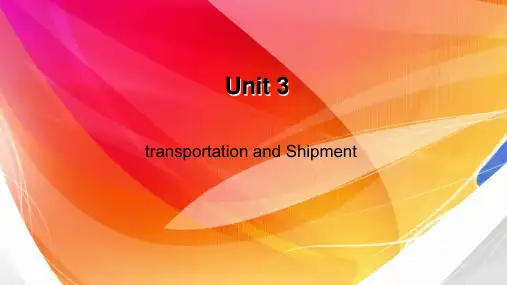
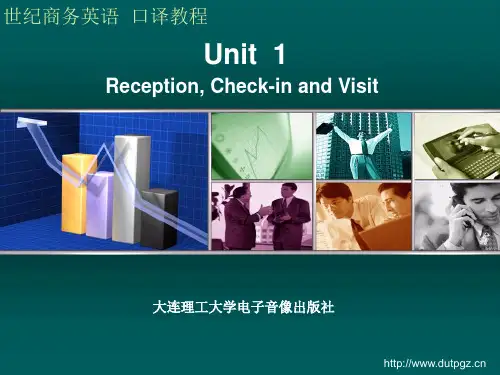
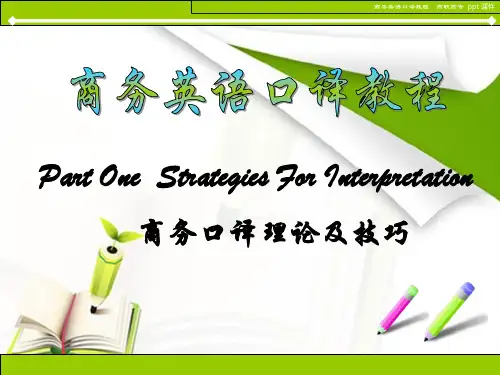




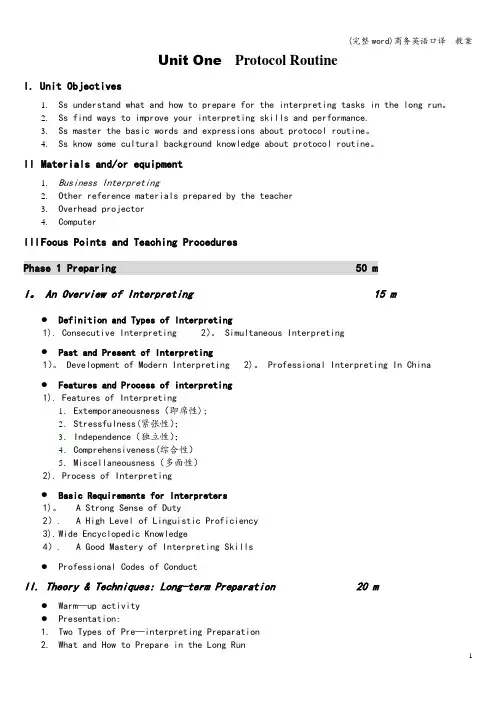
Unit One Protocol RoutineI. Unit Objectives1.Ss understand what and how to prepare for the interpreting tasks in the long run。
2.Ss find ways to improve your interpreting skills and performance.3.Ss master the basic words and expressions about protocol routine。
4.Ss know some cultural background knowledge about protocol routine。
II Materials and/or equipment1.Business Interpreting2.Other reference materials prepared by the teacher3.Overhead projectorputerIII Focus Points and Teaching ProceduresPhase 1 Preparing 50 mI。
An Overview of Interpreting 15 m●Definition and Types of Interpreting1). Consecutive Interpreting 2)。
Simultaneous Interpreting●Past and Present of Interpreting1)。
Development of Modern Interpreting 2)。
Professional Interpreting In China●Features and Process of interpreting1). Features of Interpreting1.Extemporaneousness(即席性);2.Stressfulness(紧张性);3.Independence(独立性);4.Comprehensiveness(综合性)5.Miscellaneousness(多面性)2). Process of Interpreting●Basic Requirements for Interpreters1)。
![简明商务英语口译教程Unit 1[精]](https://uimg.taocdn.com/f4c69565ba1aa8114431d978.webp)
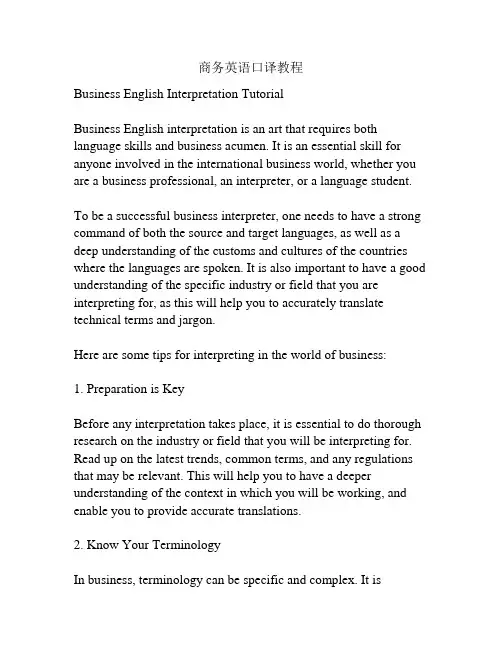
商务英语口译教程Business English Interpretation TutorialBusiness English interpretation is an art that requires both language skills and business acumen. It is an essential skill for anyone involved in the international business world, whether you are a business professional, an interpreter, or a language student.To be a successful business interpreter, one needs to have a strong command of both the source and target languages, as well as a deep understanding of the customs and cultures of the countries where the languages are spoken. It is also important to have a good understanding of the specific industry or field that you are interpreting for, as this will help you to accurately translate technical terms and jargon.Here are some tips for interpreting in the world of business:1. Preparation is KeyBefore any interpretation takes place, it is essential to do thorough research on the industry or field that you will be interpreting for. Read up on the latest trends, common terms, and any regulations that may be relevant. This will help you to have a deeper understanding of the context in which you will be working, and enable you to provide accurate translations.2. Know Your TerminologyIn business, terminology can be specific and complex. It isessential that you are familiar with key economic and financial terms, as well as industry-specific words and acronyms. This will not only help you to understand the conversations that you are interpreting but also enable you to provide clear and concise translations.3. Communicate Clearly and ConciselyAs an interpreter, your job is to act as a mediator between two parties who do not speak the same language. In this role, it is important to speak clearly and concisely, using simple language where possible. It is also important to pay attention to body language and tone of voice, which can play an important role in conveying meaning and emotion.4. Be Cultural AwareIn business, understanding cultural differences is essential. What might be considered appropriate behavior in one culture may not be in another. To be an effective interpreter, it is important to be culturally aware and sensitive to the customs and traditions of the countries where the languages are spoken. This is particularly important when interpreting for negotiations or when dealing with sensitive topics.5. Practice Makes PerfectInterpreting is a skill that requires practice. To become an effective business interpreter, it is important to practice interpreting in a variety of scenarios. This can include practicing with friends andcolleagues or taking part in role-playing exercises. Practice will help to build your confidence and improve your fluency.In conclusion, business English interpretation is both a science and an art. It requires a deep understanding of the languages and cultures of the businesses you will be working with, as well as a command of key terminology and business practices. However, with practice and preparation, anyone can become an effective business interpreter, helping to facilitate successful negotiations and build strong relationships between businesses.。
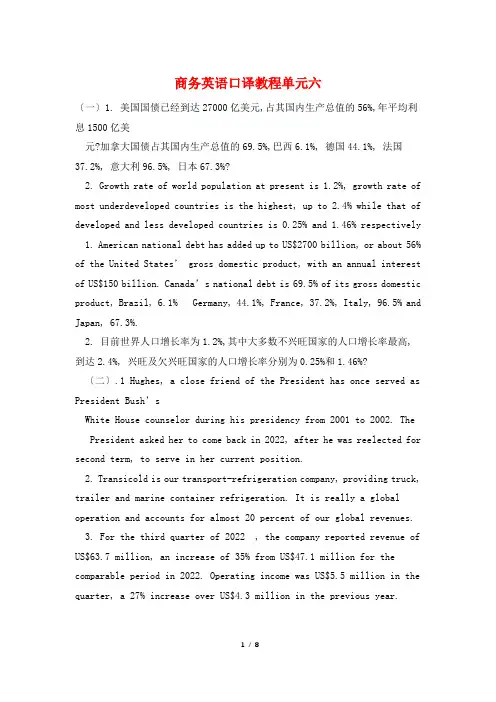
商务英语口译教程单元六〔一〕1. 美国国债已经到达27000亿美元,占其国内生产总值的56%,年平均利息1500亿美元?加拿大国债占其国内生产总值的69.5%,巴西6.1%, 德国44.1%, 法国37.2%, 意大利96.5%, 日本67.3%?2. Growth rate of world population at present is 1.2%, growth rate of most underdeveloped countries is the highest, up to 2.4% while that of developed and less developed countries is 0.25% and 1.46% respectively 1. American national debt has added up to US$2700 billion, or about 56% of the United States’ gross domestic product, with an annual interest of US$150 billion. Canada’s national debt is 69.5% of its gross domestic product, Brazil, 6.1% Germany, 44.1%, France, 37.2%, Italy, 96.5% and Japan, 67.3%.2. 目前世界人口增长率为1.2%,其中大多数不兴旺国家的人口增长率最高,到达2.4%, 兴旺及欠兴旺国家的人口增长率分别为0.25%和1.46%?〔二〕.1 Hughes, a close friend of the President has once served as President Bush’sWhite House counselor during his presidency from 2001 to 2002. The President asked her to come back in 2022, after he was reelected for second term, to serve in her current position.2. Transicold is our transport-refrigeration company, providing truck, trailer and marine container refrigeration. It is really a global operation and accounts for almost 20 percent of our global revenues.3. For the third quarter of 2022 , the company reported revenue of US$63.7 million, an increase of 35% from US$47.1 million for the comparable period in 2022. Operating income was US$5.5 million in the quarter, a 27% increase over US$4.3 million in the previous year.4. Providence will hold a conference call at 11,00 a.m. on Wednesday November 7, 2022 to discuss its financial results and corporate developments.5. In 2002, Unilever has 14 global brands with a turnover of US$0.9 billion or more. The growth rate of the leading brands is 5.4% with foods 4.4% from 1.9% in 2000.6. 2022 年前9个月,收入从去年同期的1.359亿美元增长到1.865亿美元, 同比增长 37%?9个月的营业收入同2022年头9个月的1440万美元相比, 增长了17%, 到达 1680万美元?7. 也可以拨打(866)356-3377, 国际长途请拨打(617)597-5392?可在2022年11月14日之前通过拨打(888)286-8010或(617)801-6888要求重播?8. 2001年债务为669万英镑,占净流动资产的42.3%,只比2000年增加了7.9%?9. 2000年4月,Ben&Jerry’s同意接受联合利华的购置意向,以每股43.6美元的价格出售了公司的840万股份,共计三亿二千六百万美元?10. 2002年北美市场总量为十四亿八千五百万美元,约占联合利华全球冰淇淋销售量的33%?1. 休斯,这位总统的亲密战友,曾在布什总统2001至2002 年任期间担任白宫法律参谋?2022 年总统成功连任后,又将其召回担任如今的职务?2. Transicold是我们的冷冻运输公司,提供卡车?拖车和海运集装箱冷藏效劳?它是个全球化公司,约占我们全球收入的20%?3. 2022 年第三季度,公司宣布收入6370万美元,2022年同期4710万美元,同比增长 35%?该季度营业收入550万美元,去年同期430万美元,同比增长27%?4. 普罗维登斯将于2022 年11月7日,星期三,上午11点召开会议,讨论财政问题和管理事务?5. 2002年联合利华拥有14个全球品牌,营业收入到达9亿美元或更多?一流品牌的增长率是5.4%,其中食品从2000年的1.9%增长到4.4%?6. For the first nine months of 2022 , revenue increased 37% to US$186.5 million from US$135.9 million for the same period last year. Operating income gained17% to US$16.8 million for the nine month period compared to US$14.4 millionin the first nine months of 2022.7. The call is also available by dialing (866)356-3377, or for international callers (617)597-5392. A replay will also be available until November 14, 2022 by dialing (888)286-8010 or (617)801-6888.8. Debt in 2001 was £6 690 000, 42.3% of the net current asset, only 7.9% over 2000.9. In April 2000, Ben &Jerry’s accepted the offer from Unilever of US$43.6 per share for all of the 8.4 million shares of the company witha total of US$326 million.10. In 2002, the total North American market of US$ 1485 million amounts to 33% of Unilever’s global ice cream.〔三〕1. Packing has a close bearing on sales.2. I do hope they can reach us in due time and be on the market for the season.3. We did hope we could be appointed as your agent at the very beginning of your putting goods on market.4. It is hopeful that annual turnover for the next 3 years will increase greatly.5. We can renew the agreement of agency on its expiry.6. 我们来不及更换包装?7. 您一定发现我们产品的包装美观讲究?8. 同时还加固了包装,以便使货物遭到损坏的风险减小到最低程度? 9. 我们一定会就你们提出的索赔做仔细研究的?10. 等时机成熟,我们将考虑委托你方为我方在那个地区的独家代理?1. 包装直接关系到产品的销售?2. 我真的希望这些货能准时到达我处,赶上销售季节上市?3. 我们真的希望在将产品投入市场之初担任你们的代理?4. 接下来的3年里年销售量有望快速增长?5. 协议到期后我们可以续签?6. We cannot afford time to change the packing.7. You can find our packing for this product beautiful and quitewell-done.8. And we’ll also reinforce the cartons to minimize any possible damage to the goods.9. We’ll give your claim our careful consideration.10. When opportunity matured, we would consider making you our exclusive agent for the region.A: 我们可以提出包装问题来讨论了吗? Shall we bring up packing for discussion?B: Yes, I’d like to know if your contract price includes the packing. 可以的?我想知道你们的合同价格是否包括了包装费用?A: 一般来说,合同价格中已经包括了包装费用?但你知道,不同的产品有不同的包装要求?买方通常需支付特殊包装费用?Generally speaking, packing charge is included. But you know, different products have different packing requirements. Buyers usually bear the charges of special packing.B: I see. Packing has a close bearing on sales. If it catches the eye, packing will of course help us push the sales.我明白了?包装直接关系到产品的销售?如果包装醒目,将有助于我们推销产品? A: 是的?这是我们通常的包装和唛头条款?你可以看一下,有没有特殊要求?或者也可以回去跟同事商量一下,然后通知我们?但你们得在装船前通知我们,否那么我们来不及更换包装?Yes. This is our usual stipulations about the packing and shipping mark. You can go through it and see if you have any special requirements or you can discuss it with your colleagues and inform us of the result afterwards. But you have to advise us before the shipping date. Otherwise we cannot afford time to change the packing. B: We have no objection to the stipulations. The packing is very advanced and tasteful.我们同意关于包装和唛头条款?包装挺先进的, 十分精美? A: 太好了,您一定发现我们产品的包装美观讲究?That’s great. You can find our packing for this product beautiful and quite well-done. B: Well, I think it can be on a par with that of the international market. 我认为它都可以与国际市场上的相媲美了?A: 真快乐你这么说?我们会通知厂商按要求包装?We are glad you say that. We will inform the manufacturer to have them packed as per the instruction.B: OK. By the way, what about the outer packing? 好的?对了,外包装怎么样的?A: 我们包装很小心的?我们一纸箱装5打,每箱毛重45公斤?同时还加固了包装,以便使货物遭到损坏的风险减小到最低程度?We pack the goods very carefully. We’ll pack five dozen to one carton, gross weight around 45 kilos a carton. And we’ll also reinforce the cartons to minimize any possible damage to the goods.B: Cartons? Could you use wooden cases instead?纸箱?你们能用木箱吗? A: 为什么用木箱?Why use wooden cases?B: I’m afraid the cardboard boxes are not strong enough for such a long voyage. 我担忧纸箱不够结实,经不起长途海运?A: 你没必要担忧这个?纸箱很适合海运?在我们运往欧洲大陆港口的货物中纸箱被广泛使用?还从来没有客户提出过申诉?No need to worry about that. Cartons are quite seaworthy. They are extensively used in our shipments to continental ports. There are never any complaints from our clients.B: All right, I’ll take cartons. Can you mark wording “Handle With Care〞 on the cartons?好吧?就用纸箱?你们能在纸箱上标明“小心轻放〞字样吗? A: 没问题?No problem.B: I believe this will turn out to the satisfaction of our clients. 我相信包装一定会让我们的客户满意的?A: I have something very unpleasant to talk over with you, Mr. Roberson. 罗宾逊先生,我有件不愉快的事跟你说? B: 哦?什么事?Oh? What’s it?A: The goods have been shipped to the destination. They seemed in good condition when we received them the day before yesterday. We unpacked and unfortunately found goods in two cartons did not match the quality of the samples.货物已运到目的地?前天收到货物时状况良好?我们翻开包装,结果发现两箱货物的质量跟样品质量不符?B: 很遗憾?我们一定会就你们提出的索赔做仔细研究的? I’m so regretful. We’ll give your claim our careful consideration. A: Thank you.谢谢? B: 有时候,航运公司或保险公司应负责赔偿?Sometimes the shipping company or insurance company is found to be responsible for the claim.A: I know. But the packages were in sound condition. It was the quality that we claimed for.我知道?但货物包装完整,状况良好?我们是对质量提出索赔?B: 我明白?不过,我向你们保证会及时处理的?我们会调查清楚,尽快给你们答复? I see. Well, I assure you of our prompt attention. We will investigate it and give you a reply soon.B: 怀特女士,我们已调查情况,找出了劣质的原因?Ms. White, we have looked into the case and found the reason for the inferior quality. A: Yes? 是什么?B: 是工厂工人质量检查疏忽了?我们已安排发运正确的货物到你方港口?20天内就会到达你处?希望没给你带来什么不便?There is an overlook on quality check on part of the staff in the factory. We have arranged the dispatch of correct quality to your port. They willreach you in no more than 20 days. I hope it will not cause any inconvenience to you.A: It is good to find the reason. You know these coming two months are the selling season for the goods of this nature. I do hope they can reach us in due time and beon the market for the season.找到原因就好?你知道,接下来的两个月是这种产品的销售季节?我真的希望这些货能准时到达我处,赶上销售季节上市?B: 我真的很抱歉给你们带来了不便?我们已采取措施改正,你放心,不会再出现类似情况了?I’m really regretful for the inconvenience. We have taken measures to put things right and assure you that similar case will in no case happen again.A: Hope so. How about the wrong goods? Shall we deliver them back to you? 希望如此?发运错的货物怎么办?我们把它们运回去给你们吗? B: 没必要这么做?如你们接受这些货物,我们可以给你们打6折?No need to do so. If you could accept the goods, we can offer you a 40% discount. A: That’s acceptable. 可以接受?B: 希望这次不愉快的事件不会影响我们将来的生意?I do hope this unpleasant incident will not affect our business in future. A: Of course not. We appreciate your positive action towards this affair. 当然不会?我们很赞赏你们对此事件采取的积极措施?A: 早上好?很快乐见到你? Good morning, nice to see you.B: Good morning, I’m here to have a face-to-face talk with you about the agency. 早上好?我来是想跟你面对面谈谈代理一事? A: 我等着你来呢? I’ve been expecting your coming.: Two years ago we talked about the agency of your products in our local market. 两年前我们谈过在我们市场上担当你们产品的代理?A: 是的?我们当时说,等时机成熟,我们将考虑委托你方为我方在那个地区的独家代理?Yes, and we said when opportunity matured, we would consider making you our exclusive agent for the region.B: Yes, we did hope we could be appointed as your agent at the very beginning of your putting goods on market.对?我们真的希望在将产品投入市场之初担任你们的代理?A: 但是这么少的销售量怎么委托你们充当我们的代理啊?我们当时还没准备好考虑代理事宜?所以就暂时把代理问题搁置下来了?But how could we appoint you as our sole agency for such a small quantity? We were not yet prepared to take the question of sole agent into consideration at that time. So we left aside the problem of agency. B: I understand. We have made great achievements in the past two years and played an important role in pushing the sale of your products. I’m coming today to apply for the sole agency of your product in our local market我明白?在过去的两年里我们取得了很大成绩,在推销你方产品方面发挥了重要的作用?我今天来是为了申请做你方产品在我方市场上的独家代理? A: 好啊?Great.。
商务英语口译教程答案第一单元:入门知识1. 什么是商务英语口译?商务英语口译是指在商务交流场景中,将英语口头信息转化为中文口头信息,或将中文口头信息转化为英文口头信息的一种语言技能。
2. 商务英语口译的重要性商务英语口译在国际商务交流中起着重要的作用。
通过口译,可以帮助各方在跨国商务谈判、会议等场合准确理解和传递信息,消除语言障碍,提高沟通效率,促进商务合作。
3. 商务英语口译的技巧和要素商务英语口译需要具备一定的技巧和要素,包括但不限于以下几点: - 准确理解源语言的含义:掌握源语言的语法、词汇和用法,确保准确理解对话内容。
- 快速反应:具备较快的反应能力,能够灵活应对对话中的不同场景和语境。
- 语言流畅度:要求口译者具备流利的口语表达能力,能够清晰、准确地传递信息。
- 文化意识:了解不同文化背景下的商务交际礼仪和习惯,避免文化冲突。
第二单元:常见商务英语口译场景1. 商务会议商务会议是商务英语口译的常见场景之一。
在商务会议中,口译者需要聆听并理解与会人员的发言,然后将其口头信息转换为中文或英文,以便其他人员理解。
2. 商务谈判商务谈判中的口译要求十分严苛,因为双方会就各自的利益进行交涉。
此时,口译者需要准确传达双方的观点、要求和建议,以促进双方的理解和合作。
3. 商务招待商务招待是为了展示企业形象、加强业务关系而进行的活动。
在商务招待中,口译者需要配合主办方并适应现场气氛,熟练运用商务礼仪和用语,传递信息,保持良好的合作氛围。
第三单元:商务英语口译问题解答1. 如何提高商务英语口译能力?提高商务英语口译能力需要长期积累和不断训练。
以下是一些提高口译能力的方法: - 多听多练:通过多听商务英语口语材料,尤其是与商务交流相关的内容,加强听力理解和词汇积累。
- 参与模拟口译:参与商务英语口译的模拟练习,通过反复练习提高反应速度、语言表达能力和口译技巧。
- 注重专业知识学习:了解相关行业的专业术语和商务知识,提高对商务场景的理解和应对能力。
商务英语口译教程单元二第一篇:商务英语口译教程单元二1.我们具有丰富的经营纺织品的经验。2.我们的进口商品少于出口商品。3.大多数设备都是我们公司从国外进口的。4.我们应该借鉴贵公司在海外市场的经验。5.我们诚挚欢迎国内外朋友前来与我们接洽。6.Our company specializes in the production of telecommunication facilities.7.We always put quality as the first consideration8.All products have to pass strict inspection before they go out.9.We always believe that quality is the soul of an enterprise.10.Now let me make a brief introduction to my company.1.We have had much experience in handling textiles.2.Our imports fall short of exports.3.Most of our equipment is imported from foreign countries.4.We should learn from your business abroad profitably.5.We sincerely welcome friends at home and abroad to connect with us.6.我们公司主要生产电信设备。 7.我们总是首先考虑质量。8.所有的产品在出货前都必须经过严格的检验。 9.我们始终相信,质量是一个企业的灵魂。 10.下面我简单介绍一下我公司的基本情况。1.灰色比较适合您。2.让我替您包装成礼品吧。3.现金付款,我们给予八折优惠。4.买一双鞋附送鞋带一对及鞋油一瓶。5.有时候在大卖场购物是一个好主意,你可以省很多钱。6.It’s our specialty.7.How do you like this one?8.I’m very sorry we couldn’t help you, sir.9.If I ordered a jacket now, how long would it take before I get the delivery? 10.A “factory second” may be a shirt that has some problem, or a pair of pants that is ripped a little.Sometimes the fault is very small.S o it’s a good deal to buyit.1.The gray one suits you well.2.Let me gift-wrap it for you.3.We give a 20% discount for cash.4.That includes an extra pair of shoelaces and a bottle of polish.5.It’s a good idea to shop in an outlet sometimes.You can save a lot of money.6.这是本店的特制品。7.您觉得这件如何? 8.先生,很抱歉,我们帮不上什么忙。9.如果我现在预订一件夹克,多久才能到手呢?10.“瑕疵品”可能是一件有缺陷的衬衫,或是一条有破洞的裤子。有时候瑕疪很小, 还是很值得买的。 1.这是这家餐馆的特色菜。 2.大家都吃饱了吗? 3.中国菜一般是最后喝汤,然后再上新鲜水果。 4.这是饺子,蘸着醋吃味道很好。5.中国的烹调艺术有着几千年的历史,它是中国文明的一部分。6.I want to make a toast to our host.7.I don’t care for sea-food.It doesn’t agree with my stomach.8.Thank you very much for this wonderful dinner.We really enjoyed it.9.I am not used to strong drinks.They go to my head.Do you have something mild?10.There are marked differences in climate, geography and customs in different regions of China, and food is no exception 1.This is the specialty of this restaurant.2.Did you all enjoy your dinner﹖3.A Chinese dinner always ends with soup and then followed by some fresh fruits.4.This is Jiaozi, and you can also call it dumpling.It goes well with vinegar.5.The art of preparing food in China dates back several thousand years and is an integral part of Chinese civilization.6.让我们为主人干一杯吧。7.我不喜欢吃海鲜,一吃胃就不舒服。8.谢谢您请我们吃这么好的晚餐,我们吃得很高兴。9.我喝不惯烈性酒,一喝就头疼,有没有度数低一点的酒? 10.在中国,不同的地区有着不同的气候、地理环境和风俗习惯,饮食也不例外。1.我们的产品不仅在国内最畅销,而且行销海外许多地区。2.这是我们最新研发的产品,我们的产品在国际市场上很有竞争力。3.我们有很多式样和颜色可供选择。4.A型、B型和C型汽车分别属于经济型、中档和豪华型汽车。5.我们在同一年内向市场投放这三种型号的汽车是为了全面占领市场。6.Roughly speaking, there is an upward trend in the market.7.We expect sales will be roughly the same next year.8.Prices are boosted because of shortage of raw materials.9.We are sure the sales of C3456 will start to pared with those of our competitors, our products are of higher quality and lower prices.1.Our product is not only the best seller in domestic market but also sold overseas.2.This is our latest development, which is really competitive in the world market.3.We have a wide selection of designs and colors.4.Auto models A, B, C are respectively cheap, middle-of-the-range and top-of-the-range products.5.We launched the three models in the same year in order to capture the full range of the market.6.大致说来,市场行情有上升的趋势。7.我们预计明年的销售量与今年大致相同。 8.因原材料短缺,价格有所提高。9.我们确信C3456型产品的销售将渐渐恢复常态。10.我们产品的质量比竞争对手的更好,价格也更低。A: 你好,史密斯先生,欢迎来到我们公司。Hello, Mr.Smith.Welcome to our company.B: Hi, Mr.Zhang.Nice to meet you again.I’m very excited to visit your company with the purpose of seeking possibility of cooperation with you.你好,张先生。很高兴再次见到你。能访问贵公司我很兴奋。此行目的在于深入了解贵公司以寻求合作可能性。A: 那么你们要逗留多长时间呢? So how long will you stay? B: About seven days.If necessary, we could stay longer, as we’d like to talk withyou as well as visit your factory.七天左右。如果需要的话,我们可以多停留几天。因为除了和你们会谈外,我们还希望能参观一下工厂。A: 好的,不过这得提前通知工厂了。我们先开始谈判,您看怎么样? It’s OK.But we have to contact the factory in advance.Shall we negotiate the issue at first? B: Good idea.好吧。A: 我们公司以生产日用陶瓷为主,现有员工500人,其中技术人员占40%。We are specializing in daily ceramics production at present with about 500 employees, of whom 40% are technicians.B: You’v e really got a large number of technicians.技术人员占的比例还挺大的。 A: 是的,我们很重视技术的发展和产品的开发,所以我们能以独特的技艺和出众的质量在海内外享有盛誉。That’s right.We value the development of technology and products.And thus our products enjoy a high reputation among domestic and overseas consumers for the peculiar techniques and outstanding quality B: How do you ensure quality control?你们是怎样保证产品质量的? A: 这个是质检部的工作。在发货前都会对产品做全面严格的质检。这就是我们的不合格率这么低的原因。It’s done by Quality Control Department.All products have to pass thorough and strict inspection before they go out.That’s why the percentage of inferior goods is so low.B: That’s fantastic.那很好啊。A: 此外,我们目前已与全球60多个国家和地区的公司建立了贸易关系。产品也远销国外,如韩国、意大利、法国等。反馈回来的信息坚定了我们继续扩大海外市场的信念。所以,我们衷心希望能与贵公司合作。What’s more, we have established business relations with companies in more than 60 countries and regions in the world.Our products are sold abroad like Korea, Italy, France, etc.And the feedbacks enhanceconfidence in expanding foreign market.That’s why we sincerely hope to cooperate with you.B: We also view the cooperation with you as a good chance我们也视与你们的合作为一个契机 A: 可以的话,我们今天下午安排您参观我们的厂房,您觉得这样的安排怎样? If possible, we’d like you to visit our factory this afternoon.What do you think of it? B: It’s great.那真是太好了。A: 欢迎光临,能为您效劳吗?Welcome.What can I do for you? B: I’d like to buy some Olympic souvenirs.What’s your recommendation?我想买些奥运纪念品,能给我些建议么? A: 我们有很多奥运纪念品,比如邮票、纪念币、T恤、玩具等。We have varieties of Olympic souvenirs, for example, stamps, coins, T-shirts, toys and so on.B: What are those over there? They look lovely摆在那边的是什么? 看起来很可爱的样子。A: 那是我们北京2008奥运会的吉祥物。全套一共五个福娃,它们分别是贝贝、晶晶、欢欢、迎迎、妮妮,意思是“北京欢迎你”。Those are the mascots of Olympic Games in 2008.There are five “Fuwa” in a full range, named Beibei, Jingjing, Huanhuan, Yingying and Nini with the meaning of “Welcome to Beijing”.B: That sounds interesting.They look like animals.听起来真有意思。它们的造型很像动物 A: 您说得没错。这五个吉祥物的造型融入了鱼、大熊猫、藏羚羊、燕子以及奥林匹克圣火的形象,代表繁荣、人类与自然的和谐、奥林匹克精神、健康和幸运。You’re right.They embody the natural characteristics of the Fish, the Panda, the Tibetan Antelope, the Swallow and the Olympic Flame, and carry the massage of prosperity, harmony between man and nature, Olympic spirit, health and good luck.B: Well, they’re pretty good.How much are they?噢,太漂亮了。多少钱? A: 我们有好几种价格,175元到500元不等,您手上的这套250元。We have several prices, ranging from 175 yuan to 500 yuan.The set in your hand costs 250 yuan.B: OK, I’ll take it.I’malso interested in your Olympic T-shirts.May I have a look? 好的,我要这套。我还对你们的奥运T恤感兴趣。能否看一下? A: 当然啦,请跟我来。我们这儿的奥运T恤款式新颖、颜色各异,上面印有奥运会徽章、福娃图案等。Of course, this way, please.Our Olympic T-shirts are novel in design, various in color with the logo of Olympics and the patterns of five “Fuwa” on them.B: I prefer those T-shirts with the Olympic logo on the back.How much is each? 我比较喜欢那些背上印有奥运会标志的T恤。多少钱一件呢? A: 您选中的这款每件108元。The ones you like cost 108 yuan each.B: OK, I’ll take two.What’s the total amount好吧,我要两件。一共多少钱?A: 一套福娃玩偶250元,两件奥运T恤216元,一共是466元。请您到收银台付款后凭收据来领取商品。A full range of five “Fuwa” costs 250 yuan and two pieces of Olympic T-shirts cost 216 yuan.It’s 466 yuan in total.You can take them wit h the receipt after paying for them at the cashier’s.B: Excuse me, here’s the receipt.打扰了,这是收据。A: 好的,这是您要的商品,一套福娃玩偶和两件奥运T恤。谢谢。欢迎下次光临。That’s right.Here is what you want, a full range of five “Fuwa” and two pieces of Olympic T-shirts.Thank you.Hope to see you again.A: 晚上好!Good evening.B: Good evening.晚上好!A: 明天你就要走了,还有什么事情需要我们帮忙吗? You would be leaving tomorrow.Anything else we can help you? B: No, thank you.We have booked the return air tickets in New York.Everything is ready.不需要了,谢谢。我们在纽约买了回程机票。一切都已经办妥了。A: 那太好了。请入席。咱们边吃边谈吧。That’s quite good.Please have a seat.And let’s talk over dinner.B: Thank you very much for preparing such a splendid dinner for me.多谢你为我准备了这么丰盛的晚宴。A: 在这段时间内,我们双方进行了紧张而卓有成效的谈判。不管怎样,我们还是顺利地完成了任务。We have had intense yet effective negotiations these days.Anyhow, we’ve fulfilled our tasks.B: Many successes are attributable to you.You helped us a lot during our stay.Thank you for what you have done for us.在很多方面还是要归功于你们。在这段期间,贵方对我们的帮助很大。感谢你们为我们所做的一切。A: 唉呀,我们只顾了聊天,都忘了吃了。要知道中国菜必须趁热吃,否则味道就差了。别客气,请随便用。Well, we had better not keep talking.The Chinese food only tastes good before it gets cool.Please help yourself.B: I was told that in Chinese cuisine, special attention is given to color, aroma, taste and shape.Is that true?我听说中国菜讲究色、香、味、形。真的吗? A: 你说得没错。不仅如此,中国菜还因地域而异。具体到底有多少菜系还不确定。但专家们都一致认为中国至少有八大菜系:四川菜、山东菜、广东菜、江苏菜、浙江菜、福建菜、湖南菜和安徽菜。You are right.What’s more, the Chinese cuisines are different in different areas.The precise number of regional cuisines in China is still under dispute, but experts agree on at least eight, Sichuan, Shandong, Guangdong, Jiangsu, Zhejiang, Fujian, Hunan and Anhui, the eight provinces in China.B: Ah, that accounts for it.啊,原来如此A: 你要不要尝尝我们中国的国酒——茅台酒? 茅台酒最烈,但与其他酒不同的是,它不会上头。Would you like some Chinese liquor Moutai? It is said that Moutai is the strongest, but it doesn’t go to the head as some drinks do.B: OK, I’d like to have some...Well, it tastes good.好,那我来尝尝。……嗯,口感真不错呀。 A: 感谢你们在洽谈中的合作。We’d appreciate your kind cooperation in the negotiation.B: I hope that we can keep the good cooperation between us in future.希望以后我们之间保持良好的合作。A: 祝大家生意兴隆,愿我们的买卖越做越好。I wish a brisk business for you and a continued development in our businessdealings A & B: 干杯!/ Cheers Cheers!/ 干杯!第二篇:商务英语口译教程单元一1.这是您第一次来广西吗?2.很高兴见到您。.很高兴见到您。我们一直期待着您的到来。3.我们一直期待着您的到来。4.在过去的几年里,广西发生了很大的变化,越来越多的外商开始来南宁投资。5.越来越多的外商开始来南宁投资。6.May I introduce you to our General Manager, Mr.Zhang?7.It would be a great pleasure to make their acquaintance.8.I am John Smith from the Port Klang Authority 9.It is indeed my pleasure to have received your invitation to come to Nanning at this time.10.Port Klang is situated on the west coast of Peninsular Malaysia, about 40 kilometers away from the capital city, Kuala Lumpur.1.Is this your first visit to Guangxi? 2.Nice to meet you..Glad to see you.We’ve been expecting your coming.3.We’ve been expecting your coming.4.Over the past several years, great changes have taken place in Guangxi,.More andmore foreign businessmen began to invest in Nanning.5.More and more foreign investors have come to Nanning to invest.6.我可以把您介绍给我们的张经理吗? 7.很高兴能认识他们。
商务英语口译教程答案unit1(Business English interpretationtutorial answers unit1)Unit1短语口译一1。
从时差综合症中恢复过来2。
周到的安排三.酒店4。
纪念品5。
住宿6。
提取行李7。
办理海关手续8。
行程9。
告别演说10。
适应时差1。
倒时差2。
周到的安排3。
热情好客4。
纪念品食宿5。
6。
提取行李7。
进行海关检查8。
活动安排9。
告别词适应时差10。
B1。
为......设宴洗尘2。
向......告别3。
不远万里来到…4。
很荣幸......5。
久仰大名6。
欢迎词7。
赞美8。
回顾过去展望未来9。
10。
美好回忆1。
举行宴会以纪念…2。
告别…三.一路赶来…4。
感到荣幸…5。
我一直盼望见到你。
6。
致欢迎辞7。
向8致敬。
回头看9。
展望未来10。
幸福的记忆各位嘉宾,女士们,先生们,非常感谢您热情洋溢的欢迎辞。
中国是最早的文明的摇篮和对这个古老国家的访问一直是我的梦想。
这次访问将给我一个极好的机会与老朋友见面并建立新的联系。
我希望再次表示,我非常高兴和荣幸地访问你们伟大的国家和这个可爱的地方。
镇。
我为你因为我的到来在中国为我做的一切心存感激。
作为一个中美合资企业的美国经理两年来,我不得不说中美企业管理实践存在差异。
由于我们的不同,我们比大多数中国同事更直接、更直接。
文化传统。
我不能说我们做生意的方法绝对是优越的。
毕竟,这两种管理方式都有优点和缺点。
近年来,更多越来越多的美国企业高管认识到了更人性化的优点。
中国管理方式。
我很高兴能与你们交换意见和信息,并达成协议。
共同点。
在这一天,我想和大家分享我对这个话题的看法。
来。
谢谢您!尊敬的各位来宾,女士们,先生们:非常感谢你们热情友好的欢迎词中国是最古老的文明发源地之一,访问这个文明古。
国是我多年梦寐以求的愿望。
这次访问使我有机会重见老朋友,结交新朋友。
我为自己能访问贵国和这座美丽的城市,再次表达我的愉快之情和荣幸之感。
商务英语口译教程基本信息中文名称:作者:李鸿杰出版社:机械工业出版社出版时间:20xx年02月ISBN:9787111295617开本:16开内容简介《》共分4个部分,包括口译理论与技巧、一般商务往来、商务谈判以及英语口译考试介绍;以理论做支撑,围绕商务活动的各个环节展开,同时兼顾口译考试的需要;各个部分相辅相成,互相关联。
《》可作为高职高专商务英语、国际贸易等专业的英语口译教材及口译考试参考书,也可供从事国际商务工作的人员参考使用。
图书目录前言Part 1 Theories and Skills of Interpretation口译理论与技巧 1Unit 1 An Overview of Interpretation口译概述1Unit 2 Business Interpretation Skills商务口译技巧4Part 2 General Business Relations一般商务往来 20Unit 1 Meeting at the Airport机场接机20Unit 2 Acmodation Arrangement住宿安排29Unit 3 Wele Dinner欢迎宴会38Unit 4 People Introduction人员介绍50Unit 5 Schedule Arrangement日程安排60Unit 6 pany Profile公司概况69Unit 7 Product Introduction产品介绍77Unit 8 Onsite Trip现场参观87Unit 9 Sightseeing观光游览97Unit 10 Shopping Guide购物指导106Unit 11 Farewell Party送别宴会114Unit 12 Seeing the Guest Off送客离别122Part 3 Business Negotiation商务谈判132Unit 1 Price,Quantity,Discount and mission价格,数量,折扣及佣金132Unit 2 Quality of Product产品质量141Unit 3 Terms of Payment支付条款148Unit 4 Time of Delivery交货日期156Unit 5 Insurance保险163Unit 6 Agency代理173Unit 7 Import of plete Plant成套设备进口184Unit 8 Signing a Contract签定合同196Part 4 Introduction of CATTI-The Test for Interpreter 全国翻译专业资格(水平)考试介绍-口译考试部分206Unit 1 Parts of the Test for Interpreter口译考试模块介绍206Unit 2 Simulated Tests口译考试模拟试题207Appendi_Appendi_ A常见外贸岗位名称中英文对照表223Appendi_ B常见国家(地区)名称中英文对照表225Appendi_ C常用缩略语中英文对照表229参考文献232。
商务英语口译教程
下面是整理的商务英语口译教程,希望对大家有帮助。
基本信息
中文名称:商务英语口译教程
作者:李鸿杰
出版社:机械工业出版社
出版时间:2010年02月
ISBN:978*********17
开本:16开
内容简介
《商务英语口译教程》共分4个部分,包括口译理论与技巧、一般商务往来、商务谈判以及英语口译考试介绍;以理论做支撑,围绕商务活动的各个环节展开,同时兼顾口译考试的需要;各个部分相辅相成,互相关联。
《商务英语口译教程》可作为高职高专商务英语、国际贸易等专业的英语口译教材及口译考试参考书,也可供从事国际商务工作的人员参考使用。
图书目录
前言
Part 1 Theories and Skills of Interpretation口译理论与技巧1
Unit 1 An Overview of Interpretation口译概述1
Unit 2 Business Interpretation Skills商务口译技巧4
Part 2 General Business Relations一般商务往来20
Unit 1 Meeting at the Airport机场接机20
Unit 2 Accommodation Arrangement住宿安排29
Unit 3 Welcome Dinner欢迎宴会38
Unit 4 People Introduction人员介绍50
Unit 5 Schedule Arrangement日程安排60
Unit 6 Company Profile公司概况69
Unit 7 Product Introduction产品介绍77
Unit 8 On?site Trip现场参观87
Unit 9 Sightseeing观光游览97
Unit 10 Shopping Guide购物指导106
Unit 11 Farewell Party送别宴会114
Unit 12 Seeing the Guest Off送客离别122
Part 3 Business Negotiation商务谈判132
Unit 1 Price,Quantity,Discount and Commission价格,数量,折扣及佣金132
Unit 2 Quality of Product产品质量141
Unit 3 Terms of Payment支付条款148
Unit 4 Time of Delivery交货日期156
Unit 5 Insurance保险163
Unit 6 Agency代理173
Unit 7 Import of Complete Plant成套设备进口184
Unit 8 Signing a Contract签定合同196
Part 4 Introduction of CATTI-The Test for Interpreter全国翻译专业资格(水平)
考试介绍-口译考试部分206
Unit 1 Parts of the Test for Interpreter口译考试模块介绍206 Unit 2 Simulated Tests口译考试模拟试题207
Appendix
Appendix A常见外贸岗位名称中英文对照表223
Appendix B常见国家(地区)名称中英文对照表225
Appendix C常用缩略语中英文对照表229。